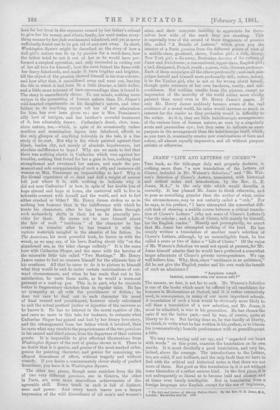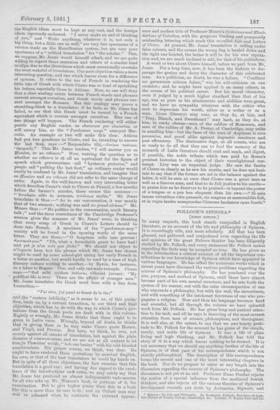JEANS' "LIFE AND LETTERS OF CICERO."* Tins book, as the
title-page duly and properly declares, is nothing more than " a new translation of the Letters (of Cicero) included in Mr. Watson's Selection;" and "Mr. Wat- son's Selection of Oicero's Letters, translated, with historical and critical notes and introduction, by the Rev. G. E.
Jeans, M.A.," is the only title which would describe it correctly. It has pleased Mr. Jeans to think otherwise, and. to pose as something grander than the author of what, under the circumstances, may be not unfairly called a " crib." For he says, in his preface, "I have attempted the somewhat diffi- cult task of steering a middle course between a critical transla- tion of Cicero's Letters " (why not sonic of Cicero's Letters P)• "for the scholar ; and a Life of Cicero, told mainly by himself,. for the English reader." Bluntly and peremptorily, we assert that Mr. Jeans has attempted nothing of the kind. He has simply written a translation of another man's selection of Cicero's Letters, although, by an unintelligible freak, he has called a score or two of dates a " Life of Cicero." Of the value of Mr. Watson's Selection we need not speak at present, for Mr. Jeans himself admits that he would have preferred a somewhat larger admixture of Cicero's private correspondence. We can well believe him. Why, then, since " omittancc is no quittance," did he not give the English-reader and his own work the benefit of such an admixture ?
" Amphora coepit Institui, ourrente rota cur uroens exit ?"
The answer, we fear, is not far to seek. Mr. Watson's Selection is one of the books which must be offered by all candidates for honours in Moderations at Oxford, and it is rather extensively used, iu consequence, in many of our more important schools.. A translation of such a book would be obviously more likely to sell than a translation of a new selection, and Mr. Jeans, it must be admitted, is wise in his generation. He has chosen the safer if not the better part,—and he was, of course, quite at liberty to do so. But having done so, he was hardly at liberty,. we think, to write what he has written in his preface, or to blazon. his (comparatively) humble performance with so grandiloquent a title.
We may now, having said our say, and "unpacked our heart with words " on this point, examine the translation on its own. merits. It is most decidedly a good translation, and very far,. indeed, above the average. The introductions to the Letters, too, are solid, if not brilliant, and the only fault that we have to find with the critical and historical notes is that there are not more of them. But good as this translation is, it is not without some blemishes of a rather serious kind. In the first place, it is not unfrequently so literal as to become bald and clumsy, and at times even barely intelligible. But in translating from a foreign language into English, except for the use of beginners, • The Lift and Lettere of Mama Mika Cicero. By the Bey, Q. B. 'Teal" CA. London ; Macmillan and Do. 1860, the English idiom must be kept at any cost, and the foreign idiom rigorously eschewed. "I never make an end of thinking of you," and " Write anything, whatever it is, not only a big thing, but a little one as well," are very fair specimens of a version made on the Hamiltonian system, but are very poor specimens of a " critical, translation" for "the scholar," This, we suppose, Mr. Jean's would himself admit, and we are quite willing to regard these sentences and others of a similar kind afislips, due to the drowsiness which must occasionally overtake the most wakeful of translators. Our next objection raises amore interesting question, and One which leaves room for a difference of opinion. It refers to the use of French in rendering the little bits of Greek with which Cicero was so fond of sprinkling his letters, especially those to Atticus. Now, no one will deny that a close analogy exists between French words and phrases -current amongst ourselves, and Greek words and phrases cur- rent amongst the Romans. But this analogy may prove a stumbling-block to a translator, if he fails, as Mr. Jeans has failed, to see that this Greek must be turned by a French equivalent which is current amongst ourselves. Else one of two things will happen. The French rendering will either puzzle any English reader, as obscurum per obscurius, or will annoy him, as the " Pardorenez mega " annoyed lier- cutio. An example or two will make this clear. Atticus had put two questions to Cicero, and he, intending to answer the last first, says :—" Respondebo tibi,—Ocreipos sporgpoy, ' This Mr. Jeans renders, " I will answer you en Hombre, or an• ?about's." Now, waiving the question as to whether au rebours is at all an equivalent for the figure of speech which grammarians call " hysteron proteron," and people call "putting the last first," an ordinary reader would surely be confused by Mr. Jeans' translation, and imagine that on Hombre and au rebours did not refer to the same change of order. Again, in the well-known and very interesting letter which describes Camas's visit to Cicero at Puteoli, a few months before the former's murder, there occurs this sentence :- " Yroactiom otAb in sermon°, pexcfxoyes multa." Mr. Jeans translates it thus :—" As to our conversation, it was mostly that of two savants ; nothing was said au grand serieux." Mr. Munro thus :—" No politics in the conversation, much literary talk ;" and the terse correctness of the Cambridge Professor's 'version gives the measure of Mr. Jeans' error, in thinking 'that every scrap of Greek in Cicero's Letters should be ,done into French. A specimen of the " pardonnez-moy " variety will be found in the opening words of the same letter. They are these,—" 0 hospitem mihi tam gravem ! cisserospis nT01,." " Oh, what a formidable guest to have had! and yet je &en mete pas facia." We should not object to n'importe here, but the phrase which Mr. Jeans has chosen might be used by some school-girl airing her early French in a letter to another, but would hardly be used by a man of high literary culture writing to another,—by Byron, for instance, in a letter to Rogers. Ono, and only one more example. Cicero says :—" Sed mihi quidem swiss-as viderint juvenci : ' My • ,political life is over. These are the affairs of younger men." Mr. Jeans translates the Greek word here with a line from Lamartine,— "rai vecu, j'ai passe co desert do la vie;" and the "curious infelicity," as it seems to us, of this quota- tion, leads us, by a natural transition, to our third and final objection, which has to do with the way in which Cicero's quo- tations from the Greek poets are dealt with in this volume. Rightly or wrongly, Mr. Jeans thinks that these ought to be given in Latin verse. Wrongly, beyond all doubt, he thinks i that in giving them so he may make Cicero quote Horace, and Virgil, and Persius. But here, we think, ho errs, not merely against all canons of translation, but against the plain -dictates of common-sense, and we are not at all content to let hiraS,in Thersites' words, " bob our brains" with his cold-blooded anachronisms. His proper course, we think, was clear. He ought to have rendered these quotations by metrical English, his own, or that of the best translators he could lay hands on. But in spite of all these objections, the fact remains that this translation is a good one ; and having duo regard to the excel- lence of the introductions ancb notes, we may safely say that Mr. Jeans has produced an almost indispensable vade-mecum for all who take up Mr. ,Watson's book, or portions of it, for examination. But to give higher praise than this to a book like this is more than we care to do ; and an Oxford man may well be ashamed when ho contrasts the outward appear- ance and modest title of Professor Munro's Criticisms and Eluci. dations of Catullus, with the gorgeous binding and pompously misleading lettering which mark this so-called Life and Letters of Cicero. At present, Mr. Jeans' translation is sailing under false colours, and the sooner the wrong flag is hauled down and the right one hoisted, the better it will be for his own reputa- tion and, we are much inclined to add, for that of his publishers.
A word. or two about Cicero himself, before we part from Mr, Jeans. For a long time, now, it has been the fashion to dis- parage the genius and decry the character of this celebrated. man. As a politician, no doubt, he was a failure. " Confiteor me germanum asinum fuisse," was his self-criticism on one occasion ; and he might have applied it on many others, in the course of his political career. But his moral character, oven if judged by a much higher standard than that of his ago, was as pure as his attainments and abilities were great, and we have no sympathy whatever with the critics who seek to depreciate his worth, either as a writer or as a man. Lions (literary) may roar, as they do, at him, and "Tray, Blanch, and Sweetheart" may bark, as they do, at him, in ready chorus—men of the calibre of Mommsen, and men of the calibre of Mr. A. Pretor, of Cambridge, may unite in assailing him—but the fame of the man of Arpinum is acre perennius, and proof alike against dogmatic insolence and pert effrontery. The diminutive dogs, at all events, who are so ready to do all that they can to foul the memory of the monarch of Latin literature should read and mark, and digest, if possible, the noble tribute which was paid by Rome's greatest historian to the object of their unenlightened con- tempt. Livy was an impartial judge. Ho saw the faults of Cicero as clearly as he saw his merits, and he does not hesi- tato to say that if the former are set in the balance against the latter, it will be seen at once that Cicero was a great man as well as a famous man, and that to do full justice to his merits— to praise him as he deserves to be praised—is beyond the power of a tongue or a pen less eloquent than his own :—" Si quis tamen virtutibus vitia pensarit, vir magnus et memorabilia fuit, et in cujus laudes exsequendas Cicerone laudatore opus fuerit."



































 Previous page
Previous page